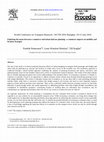Papers by Fredrik Pettersson

The aim of this study is to discuss potential long term effects of online shopping on transport (... more The aim of this study is to discuss potential long term effects of online shopping on transport (both passenger and freight) and urban land use planning (e.g. structure and location of retail) with a focus on the Swedish case. The explorative approach is conducted through a mixed method approach combining the analysis of planning documents and reports, interviews with planners/private actors for the Swedish context and a review of international research literature. The results of the study indicate that in Swedish planning documents the current understanding of the potential effects of increasing e-commerce is limited. E-commerce is typically viewed as an opportunity to address transport system related issues through substituting passenger travel with freight distribution. The review of literature reveals that e-commerce so far has done little to alter prevailing individual mobility habits while there is conclusive evidence that freight transport will increase and result in more dispersed transport patterns as home delivery becomes more important. There is also a potential conflict between consumer pressure for fast home deliveries of goods bought online and current approaches to addressing problems with urban freight through consolidation and coordination of distribution transports. Concerning location of retailing there are indications that e-commerce may be contributing to an ongoing transformation where the role of city centres as commercial areas are reduced. An important implication for urban planning is consequently that the continued trend towards e-commerce should not be regarded as an easy solution for an unsustainable transport sector. While increasing e-commerce can bring about changes that could support less car-dependent planning and thereby encourage policies for enhancing the transition towards a more sustainable society, it is far from obvious that this will be the case. To harness the potential benefits of increasing e-commerce there is a need for developing pro-active planning strategies that address the impacts of e-commerce fully. At the same time, this study indicates a lack of knowledge regarding the long term effects of e-commerce on the transport sector which can only be solved through more research carried out.
Transport Policy, 2013
This paper presents an analysis of a regional transport infrastructure plan in Sweden. A comparis... more This paper presents an analysis of a regional transport infrastructure plan in Sweden. A comparison is made of two concepts central to transport infrastructure planning in Sweden; Regional expansion and Environmentally sound transport. These concepts signify different perspectives on the benefits and problems with transport. The analysis explains how these clashing perspectives are resolved in the planning process. A discourse theoretical framework is applied to analyse the interplay between the concepts, the framings of problems and solutions, knowledge production practices and the outcomes of the planning process.
Transport Policy, 2013
This paper presents an analysis of a regional transport infrastructure plan in Sweden. A comparis... more This paper presents an analysis of a regional transport infrastructure plan in Sweden. A comparison is made of two concepts central to transport infrastructure planning in Sweden; Regional expansion and Environmentally sound transport. These concepts signify different perspectives on the benefits and problems with transport. The analysis explains how these clashing perspectives are resolved in the planning process. A discourse theoretical framework is applied to analyse the interplay between the concepts, the framings of problems and solutions, knowledge production practices and the outcomes of the planning process.
Planning Theory & Practice, 2014
Uploads
Papers by Fredrik Pettersson